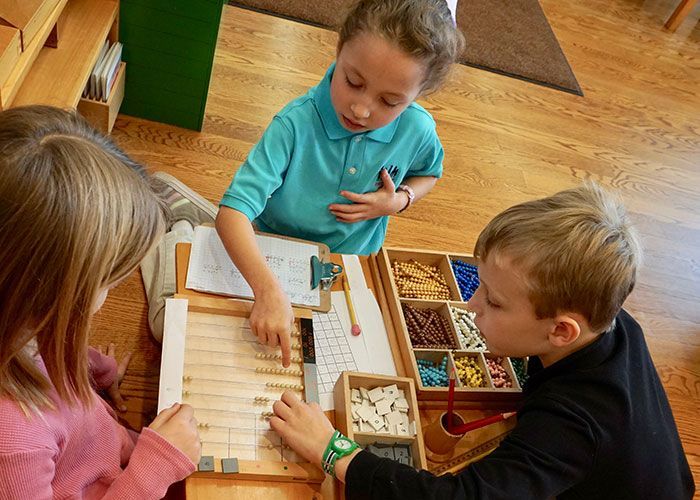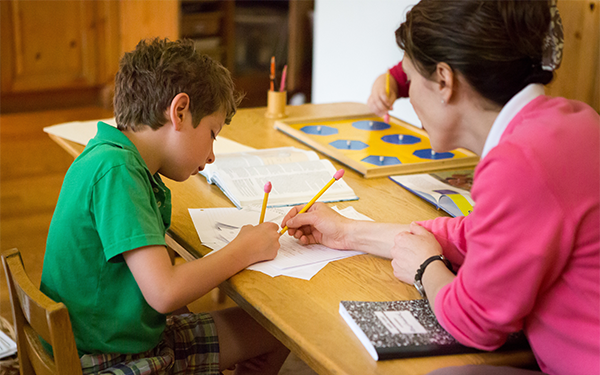Digital Technology

Adapting with Technology Was Empowering We are more grateful than ever for the technology in our lives! During the pandemic, being physically separated from one another was painful, especially for our children who crave social interaction. Out of necessity, we learned inventive ways that computers, iPhones and iPads could connect us–to one another and to information about the world. The worldwide Montessori community of educators found creative ways to use technology to reach students, which was an empowering example of how Montessori’s educational approach is designed for adapting to any time, culture and place. We learned to “teach” through the screen with voice, facial expressions, and using cameras to film teachers’ and students’ hands working Montessori materials. Teachers made and delivered materials to families and wrote directions for how to make one’s own versions. Many children and parents fashioned creative replicas and pivoted to continue their learning at home. It was a massive effort to translate Montessori education into new formats and to open access to more communities. Learning ways to adapt was liberating and the result is that many more people found Montessori as an option for schooling. Dr. Montessori would have cheered the adaptation, because she believed it to be perhaps the most important quality of childhood. The Drawbacks of Increased Technology for Children In these past two years, most children have become accustomed to using technology to communicate with friends, investigate information, use social platforms, and to text and chat. Their younger minds seem designed to intuitively navigate these forums much faster than adults. This is not an illusion. Have you noticed how quickly and nimbly your children learn to work around obstacles and outsmart even…you? There are drawbacks, however, some of which you have probably observed. Many children become irritable, less patient, and lose their ability to focus or to calm themselves after spending an hour or more on screens such as iPads, cell phones, or other screen devices. Longer term effects can impact children’s fine motor and gross motor development, social skills, and emotional regulation. Because being able to calm oneself, being able to focus and being patient with oneself and others are imperative skills, this trend is worrisome. For children who are developing, any technology use–simply because it does not integrate the five senses and movement the way that real life does–can be considered overuse. When you as a parent decide whether or not to give your children time with screen devices, consider the developmental consequences that will affect them. This is important, because we cannot go back in time and reset our children’s minds and bodies once they pass through each developmental stage. Montessori reminds us—and science has proven—that the most influential times in a person’s life are in childhood: Years 1-6 are especially absorbent and malleable; trillions of neuronal pathways are being formed and pruned. These children need to explore their surroundings with their five senses, to use their fingers and hands to develop their abilities, develop gross motor skills for balance, core strength, and overall health. They need to be thinking, engaging with their surroundings, interacting, listening and speaking to communicate and developing their vocabulary, pronunciation, and interpersonal skills for cooperating, collaborating and expressing their thoughts and feelings in pro-social ways.

In a previous blog post, A Montessori Guide to Technology and Teens , we explored how we can help our adolescents begin to use technology responsibly, as part of adapting to the adult world. Here we will discuss a Montessori perspective on the role of technology and screen time for younger children, under age twelve. What’s the Big Deal? These days, messages from marketers are strongly pro-technology for children, and even some educators are strongly pro-technology. Everyone has their own experiences to base their judgments on; if you’ve seen negative results in your own family, you might look to the current research to validate your sense that technology is not a good fit for childhood. Conversely, if you’ve had positive or neutral experiences with your children using technology, then you probably think people are going bananas over something minor. Either way, most parents don’t have the time to conduct a thorough Ph.D.-level investigation before deciding whether their child can have that video game or the latest digital device they just opened under their grandparent’s Christmas tree this year. So, what are we to think about this debate over technology for children, and what do we want to steer our children towards in our own homes? When we look at this issue from the perspective of a Montessori approach, we consider: what children need for optimal development, the importance for a child of building their foundation for life, preparing your home environment, basing your decisions on observations, and keeping your long-term goals in mind. What Children Need for Optimal Development Dr. Montessori pointed out that under the age of six, children need reality so that they can form their understanding of it. They need to touch, feel, taste, smell, move and experience the real world. Human beings are sensorial learners when young. From their sensorial explorations, young children learn things about physics, textures, and qualities of the world. Consider that no screen can provide this information in a natural or full-sensory way. Children need to discover for themselves what kind of structures collapse under pressure and which ones don’t, and to figure out why by exploring and experimenting. To be effective, this has to happen in reality, not virtually.



